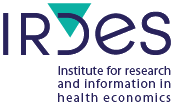|
Every quarter, find the latest health economics
news at IRDES: publications, seminars, interviews, detailed
figures and documentation tools.
 See
previous letters See
previous letters
Every month find the
French Newsletter
Spotlights
Charts
Documentation
 |
Keep an Eye on Health Economics Literature
Produced by IRDES documentation centre,
Watch on Health Economics Literature, a monthly publication since April 2017, presents by theme
the latest articles and reports in Health Economics:
both peer-reviewed and grey literature.
|
Forthcoming
 |
Next participation of IRDES Researchers
in National Conferences
|
|
IRDES news
Reminder
Recent Publications
IRDES publishing

|
The Heterogeneity of Hospitalisation Admission for Depression is Linked to Prior Healthcare
Nestrigue C., Coldefy M., Mousquès J. (IRDES) In collaboration with Daniel F. (ISPED, IRDES), Younès N. (University of Versailles Saint-Quentin, IRDES)
Issues
in Health Economics (228), June 2017
According to the World Health Organisation (WHO), depression is now the leading cause of disability in the world. Despite the existence of treatments, a large part of the world’s population - including in the developed countries - does not have access to them. General practitioners (GPs) play a key role in the treatment of this disorder. However, GPs in France refer patients suffering from depression less often to other healthcare professionals.
According to the European Health Interview Survey-The Health, Health Care and Insurance Survey (EHIS-ESPS), the estimated prevalence of depression in France is 7%, representing almost 4 million people aged 15 or over. In 2012-2013, 200,000 initial hospitalisations for a depressive episode were recorded in health institutions (data from the National Inter- Scheme Information System on Health Insurance (SNIIRAM) cross-referenced with hospital data). These hospital episodes are classified into 9 categories. They bring out the heterogeneity of the healthcare, the frequency of hospitalisations in medical rather than psychiatric units, and the fact that they are often 'unplanned'. Hence, 1 out of every 10 people initially hospitalised - particularly in the case of recipients of Universal Complementary Health Insurance (Couverture Maladie Universelle Complémentaire, or CMU-C), young people, and the very old - did not receive ambulatory care before the hospital episode. A psychiatrist was consulted by 3 out of every 10 patients hospitalised and more than half of the patients were prescribed antidepressants prior to hospitalisation.
The analysis subsequently focused on 5 categories of hospital episode in order to study patient care through the use of ambulatory care provided by GPs and psychiatrists during the six-month period prior to hospitalisation.
|
|
Are There any Lessons to Be Learnt in France from the American Experience of Accountable Care Organizations?
Mousquès J. (IRDES), Lenormand M.-C. (CNAMTS)
Issues
in Health Economics (227), April 2017
The Affordable Care Act, which is commonly referred to as 'Obamacare' and was adopted in the United States in 2010, is known primarily for its emblematic objective of making healthcare affordable to the entire population. A title of the law also focuses on the promotion of new healthcare organisations to foster better coordination between healthcare professionals and improve the quality and efficiency of healthcare delivery.
As of 2012, the Center for Medicare and Medicaid Innovation conducted various experiments with the primary goal of strengthening primary care. The Accountable Care Organization (ACO) is the most ambitious of the reform models as it also fosters improved coordination between ambulatory and hospital care organisations. Organisations of this type have spread rapidly since their introduction. In January 2016, more than 800 ACOs coordinate care for 28 million people, representing 15% of insured Americans.
This overview of the literature on this subject studies the characteristics of the ACOs, their performance, and the tools and schemes adopted, and offers valuable insight for the French health system.
|
IRDES Researchers' publications in other venues
 |
Adaptive Pathways: Possible Next Steps for Payers in Preparation for Their Potential Implementation
Vella Bonanno P., Ermisch M., Godman B., Martin A.P., Van Den Bergh J., Bezmelnitsyna L., Bucsics A., Arickx F., Bybau A., Bochenek T., van de Casteele M., Diogene E., Eriksson I., Fürst J., Gad M., Greičiūtė-Kuprijanov I., van der Graaff M., Gulbinovic J., Jones J., Joppi R., Kalaba M., Laius O., Langner I., Mardare I., Markovic-Pekovic V., Magnusson E., Melien O., Meshkov D.O., Petrova G.I., Selke G., Sermet C., Simoens S., Schuurman A., Ramos R., Rodrigues J., Zara C., Zebedin-Brandl E., Haycox A. Front Pharmacol. Frontiers in pharmacology, vol 8, n° 497, 2017/08, 1-13. |
| |
Compulsory Hospitalization, Severity of Disorders and Territorial Landscape: A French Study
Roelandt J.-L., Crétin A., Askevis-Leherpeux F., Baucheron J.-P., Brun-Rousseau H., Coldefy M., et al., Global Journal of Health Science, vol. 9, n° 12, 2017.
|
| |
Smoking Inequalities in France and the United States / Inégalités sociales de tabagisme en France et aux Etats-Unis
Pampel F., Bricard D., Khlat M., Legleye S., IUSSP's online news magazine, 27/11/2017, 1-4.
|
| |
Social Heterogeneity in Self-Reported Health Status and the Measurement of Inequalities in Health
Jusot F., Tubeuf S., Devaux M., Sermet C., In Perceived Health and Adaptation in Chronic Disease. Guillemin F., Leplège A., Briançon B., Spitz E., Coste J., Eds. Londres : Routledge, 2017, 175-195.
|
3 questions to...
Next Letter: March 2018
|








